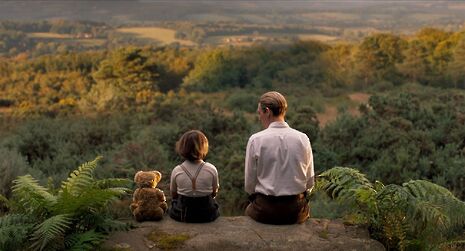Review: Looking back in Goodbye Christopher Robin
Charmed by an exquisite first act of childhood memories, Lillian Crawford finds this British biopic to be a unique reflection on life with the Milnes in Ashdown Forest

The children’s books we know and love very rarely have similarly charming backstories. Once uncovered, these tend to become mythologised and tampered with, turning many against the likes of Enid Blyton and Lewis Carroll, but never enough to disrepute their works. Gone Girl made for an intriguing assessment on the subject, its heroine battling with the idyllic Amazing Amy her parents paraded her around as. Thankfully, as far as we know, C.R. Milne never faked his own death and killed an ex-lover with a box cutter, but the impact of Winnie the Pooh on his life proved just as startling.
“One is cast back to days of a pure innocence that would melt even the heart of a woozle”
The first half of Goodbye Christopher Robin is quite unlike this, however, and instead provides for a wonderful hour of childhood reminiscence. Will Tilston is the perfect centre of attention, and with his dimpled cheeks makes for a most adorable screen presence that draws everyone around him into his fantastical realm. As the camera closes in on bubble bath beards and walks in the forest, one is cast back to days of a pure innocence that would melt even the heart of a woozle. Accompanied by Domhnall Gleeson’s immensely likable A.A. Milne, the scenes of awkward cricket, following footprints in the snow, and, of course, Pooh-sticks, facilitate a spectacularly enchanting return to youth that has one scanning the bookshelf to uncover his tales once more.
There is, however, quite a startling heffalump in the room that elevates it above other Sunday tea-time biopics. A.A. Milne’s PTSD is creatively explored, and in this uniquely domestic setting often pulls the rug from beneath his son’s feet as a reminder of the tragedy buried under the honey-smothered treats. Indeed, the grief and pain that ensues often forces one to hide one’s own blubbering and, much like the film’s central family, maintain one’s composure to the bittersweet end. Gleeson delivers this with unfaltering believability, and the weariness seen in his eyes at the close feels as earnest as Tilston’s earlier joviality.
The same cannot be said for Margot Robbie, who plays Christopher’s mother with an almost farcical evil stepmother-like vibe. Her feeble attempt at an English accent is also unnecessarily forced, comparable to Eliza Doolittle or co-star Kelly Macdonald’s Evangeline in Nanny McPhee. The film’s weakest points suffer from her incongruity onscreen, flitting from caring to distant, much like the opening, which is later repeated without need. Nevertheless, the decision to continue the narrative into Christopher’s schooldays and the Second World War creates some of the most emotionally challenging moments, and a remarkable comparison to his father’s own experience. However, the 18-year-old version is given relatively little development in the rushed final act that, with improved pacing elsewhere, could have warranted a longer runtime.
None of these points render Goodbye Christopher Robin any less enjoyable, and while certainly no masterpiece of cinema, it is an often-inspiring work. There is plenty of humour to lighten the tone, with many a subtle reference to Pooh’s escapades, and a scene-stealing Phoebe Waller-Bridge as a Times journalist. It is only once the display of parenting takes on a slightly sinister atmosphere that one realises they have been in caught up with Christopher’s charm as much as the rest of the world, which certainly alters one’s perspective on the whole affair. Revisiting memories of unfiltered imagination is a real treat, and soon one too can again see swords in sticks and doors in trees, albeit through the rose-tinted idealism of a camera lens
 News / Cambridge academics sign open letter criticising research funding changes22 February 2026
News / Cambridge academics sign open letter criticising research funding changes22 February 2026 News / Supporters protest potential vet school closure22 February 2026
News / Supporters protest potential vet school closure22 February 2026 News / University Council rescinds University Centre membership20 February 2026
News / University Council rescinds University Centre membership20 February 2026 News / Hundreds of Cambridge academics demand vote on fate of vet course20 February 2026
News / Hundreds of Cambridge academics demand vote on fate of vet course20 February 2026 Comment / A tongue-in-cheek petition for gowned exams at Cambridge 21 February 2026
Comment / A tongue-in-cheek petition for gowned exams at Cambridge 21 February 2026








